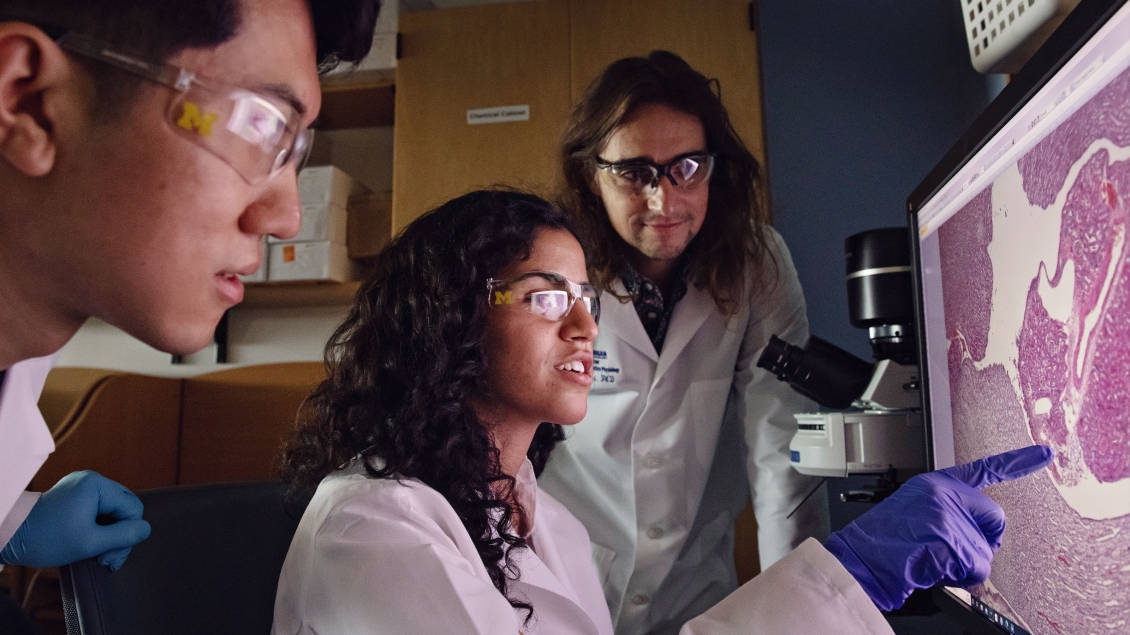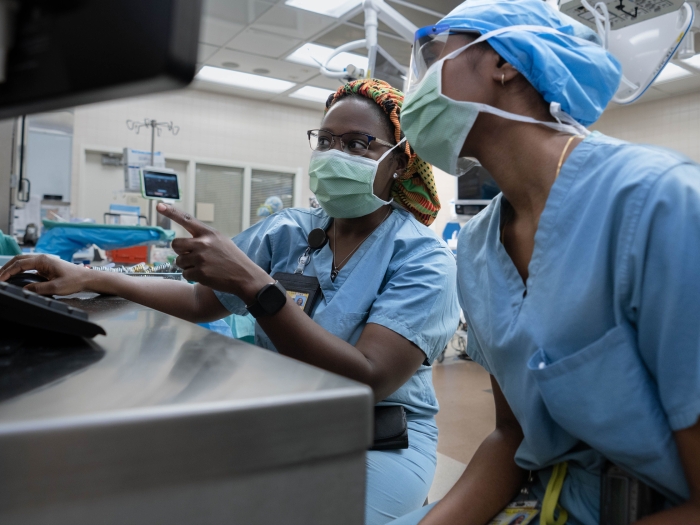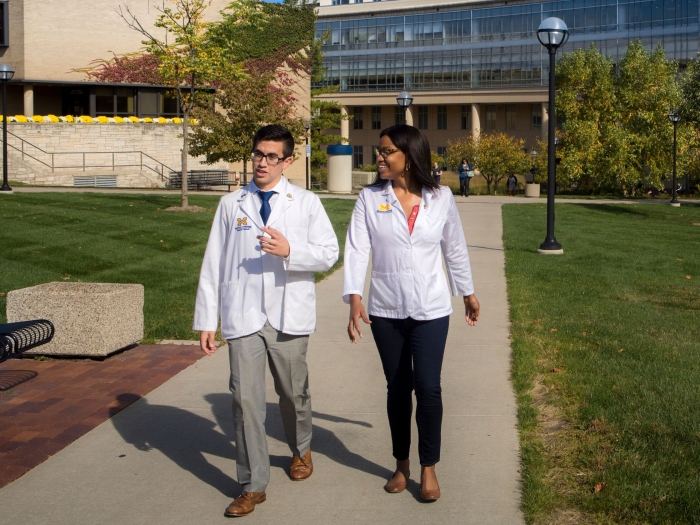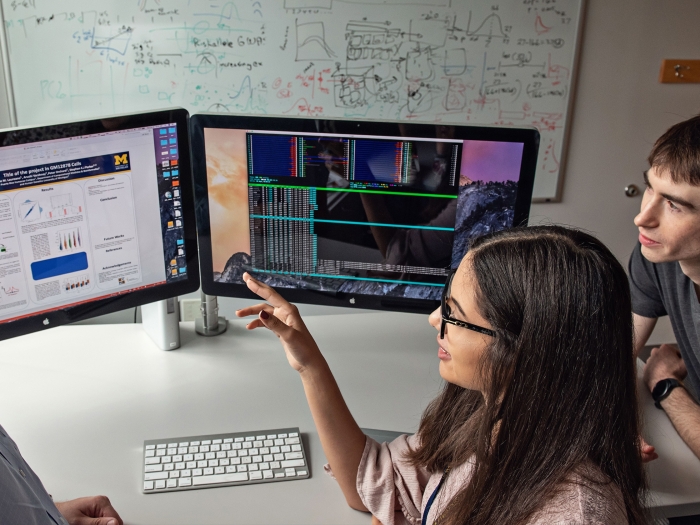
Dual Degree Partners
Medicine and _______.
When you’re surrounded by this many top schools in one place, a dual degree is worth serious consideration. More than 15% of our students choose to fill in the blank with another degree—a group that’s growing every year.
We have long-established relationships with our dual degree partners, which makes facilitating connections for students an easy process. You will have the flexibility you need to combine the medical curriculum with a degree in another field. Earning a dual degree is just one of several ways med students can fulfill their Capstone for Impact graduation requirement.
Located adjacent to the University of Michigan’s Central Campus, the Medical School is steps away from the School of Public Health, around the corner from the major biomedical research facilities, and a short walk, bike or bus ride to the North and South campuses.
University of Michigan maps:
Students who are interested in pursuing a dual degree will coordinate with their counselor/advisor to take time out during the Branch years. They stay connected with their chosen support systems but are required to work with the Student Services team for emergent issues and to transition back to the MD program.
Our dual degrees are integrated programs, but there are differences between the dual degrees.
The MD/MBA, MD/MPP and some MD/MPH programs are combined degrees that share the same degree citation and are conferred only after the completion of both degrees’ requirements.

The goal of this five-year, integrated combined MD/MBA program is to provide students with a chance to explore complementary interests and career goals that combine medicine and business.

The MD/MPP dual degree is a unique opportunity for students to understand the intersection of public policy and medicine, and gain skills to effectively analyze and manage programs and data. Graduates are prepared to apply these new techniques in the health care arena to improve patient care, to enhance the quality of medical decision making, and to contribute to medical education and training.

Michigan’s School of Public Health is one of the top-rated programs in the country. Each year a number of students choose to pursue the MD/MPH. Programs of study include Biostatistics, Environmental and Industrial Health, Epidemiology, Health Behavior and Health Education, and Health Management and Policy.
All other dual degrees, initiated through Rackham Graduate School, lead to two separate degree citations on a transcript and two separate diplomas.

The SEAS MD/MS dual degree can be established through Rackham Graduate School as a self-initiated dual degree. Medical students typically take a leave of absence from medical school between the third and fourth years of study to complete their master’s degree coursework.

The HILS MD/MS program is offered through the Rackham Graduate School and follows their admissions process. HILS consists of 27 credit hours and is designed to be completed in three semesters over 12 months. Students typically take a leave of absence from medical school between the third and fourth years.

The MD/MSI at the School of Information consists of 39-42 credits. Students typically take a leave of absence from medical school between the third and fourth years of study to complete their coursework. The MSI summer internship is completed between the fourth and fifth years.

MD/MS HILS Online aims to improve the health of individuals and populations by developing researchers who design, implement and evaluate innovative change and continuous improvement in health systems. The 27-credit program is completed in 3 semesters over 12 months full-time or 2-3 years part-time.
Our students may also request an educational leave of absence and apply to complete the following master degrees even though no formal agreement between the programs currently exists:
The Medical Scientist Training Program is a joint effort of University of Michigan graduate and medical schools to provide a superb and balanced training in science and medicine. Approximately nine students are admitted to the program each year. Fellows receive full tuition stipend support and health insurance coverage.
The MSTP curriculum generally requires seven full calendar years, but many fellows take eight. Typically, MSTP fellows begin with the two-year preclinical phase in the MD curriculum, additional graduate course modules in biological chemistry or other areas, and laboratory rotations in the summers. All fellows must take and pass the USMLE Step 1 examination before becoming full-time graduate students.
In the Graduate Phase, they complete the requirements for PhD candidacy, including preliminary examinations, thesis research, and a written dissertation. After defense of the dissertation, fellows return to the MD curriculum to begin the Clinical Phase of their education, including required clerkships, a sub-internship, electives and the USMLE Step 2 examination. In recognition of the interdependency of the degrees, the University confers the MD and PhD degrees only after the completion of both programs’ requirements.
Many doctoral programs are available to students, and entering fellows are not required to choose a doctoral field until midway through their second year.
The Oral and Maxillofacial Surgery six-year integrated program has been developed to comprehensively prepare the graduate dentist for a career in Oral and Maxillofacial Surgery. This is a broad spectrum, integrated clinical and academic program designed to provide a wide scope of clinical practice and to meet the requirements leading to certification by the American Board of Oral and Maxillofacial Surgery. The residency program is fully accredited by the Commission on Dental Accreditation of the American Dental Association.
Following successful completion of this residency program, students receive:
- A medical degree from the University of Michigan Medical School
- A certificate of completion for a two-year General Surgery Internship allowing eligibility for medical licensure in all fifty states
- A specialty certificate in Oral and Maxillofacial Surgery
Three applicants are selected each year for the graduate program that begins the third week in June and continues for six calendar years. Students are selected for the program on the basis of scholastic record, research experience, personal qualifications, extracurricular activities, communication skills, commitment to the patients, letters of recommendation and an aptitude for graduate studies.
The first year of residency is focused on learning medicine, patient care, basic surgical skills and completing selected first year Medical School requirements. The second and third years are mostly devoted to Medical School requirements. The fourth through sixth years emphasize the clinical/surgical experiences in both General Surgery and Oral and Maxillofacial Surgery.
Applicants must apply to the program through Postdoctoral Application Support Service (PASS).